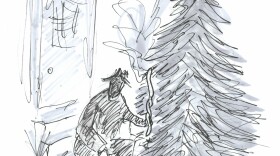
Robert Krulwich
Robert Krulwich has been called “the most inventive network reporter in television” by TV Guide.
His specialty is explaining complex subjects, science, technology, economics, in a style that is clear, compelling and entertaining. On television he has explored the structure of DNA using a banana; on radio he created an Italian opera, “Ratto Interesso” to explain how the Federal Reserve regulates interest rates; he has pioneered the use of new animation on ABC’s Nightline and World News Tonight.
Robert now reports for National Public Radio. His NPR blog, “Krulwich Wonders”, features drawings, cartoons and videos that illustrate hard-to-see concepts in science. He is also co-host of “Radiolab”, a nationally distributed radio series that explores new developments in science for people who are curious but not usually drawn to science shows. (“There’s nothing like it on the radio, “ says Ira Glass of This American Life, “It’s a act of crazy genius.”) Radiolab won a Peabody Award in 2011.
-
There was a spruce tree in Stanley's garden, and when September rolled around, a family of garden snakes used it to sunbathe. They'd squiggle out on a branch, flop down and warm themselves in the sunshine — sometimes dangling in braided pairs. Stanley, envious, decided to join in ... and here's what happened next.
-
Snails getting ready for winter are natural carpenters. They construct doors, or maybe you'd call them walls, inside their shells. They do this without hammers, nails or cement. Instead, they use their foot — and of course, their favorite material, mucus. Welcome to the ingenious world of snail construction.
-
Drones are for spying, right? Right. But if Jasper van Loenen's idea works, drones will also become private moving vans. Crows won't like this. Trees won't like this. I'm not sure I like this. But you've got to see Jasper's instant-drone deliver a bicycle wheel across campus ...
-
A New York design team has just produced an invisibility cloak for your cellphone. Pop it in and no government, no merchants, no friends, no one knows where your phone is. Another design team in Canada says it could do stuff like this — but it won't. Who's right?
-
Death, it appears, prefers gentlemen to ladies. Women don't just outlive men, they consistently outlive men at every stage of life. More boys die in utero, in infancy, in adolescence, in middle age, at every stage. That's why nature makes more of them. But why? What's so fragile about guys?
-
What can you do with beach sand? Build a sand castle. Dig a canal. Make a snake. What can you do with MIT's "smart" sand? One day, you will turn it into a hammer, fork, chair, anything you want. And when you're done? Poof! It's sand again.
-
SpaceX calls it the "Grasshopper" — it's a rocket that doesn't fall back to Earth haphazardly after launch. It carefully returns itself to the launchpad standing up, right where it started.
-
Put away that old Rand McNally map — it's time for a new way to see what America really looks like.
-
What if you put all 7 billion humans into one city, a city as dense as New York, with its towers and skyscrapers? How big would that 7 billion-sized city be? As big as New Jersey? Texas? Bigger? Are cities protecting wild spaces on the planet? We try a little experiment to find out.








